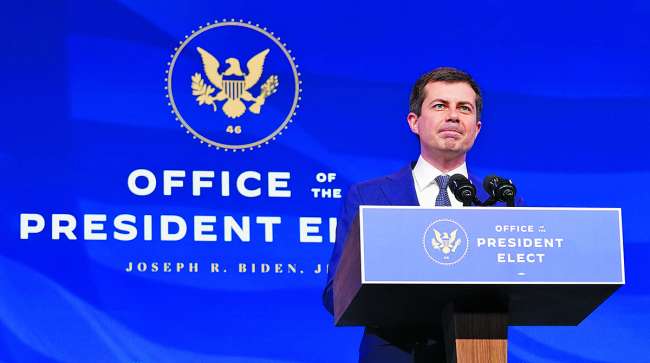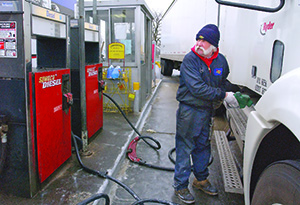Staff Reporter
Trucking Braces for ‘COVID Hangover’ and Ongoing Battles in 2021

[Ensure you have all the info you need in these unprecedented times. Subscribe now.]
As the COVID-19 pandemic stretches into 2021, the trucking industry will continue to address coronavirus-related challenges while confronting issues that existed long before most people had ever touched a face mask.
The pandemic has slowed efforts to train, test and license truck drivers at a time when the industry’s persistent driver shortage topped the American Transportation Research Institute Top Industry Issues list for a fourth year in a row.
Shutdowns and restrictions at training schools and motor vehicle administrations clamped down on the flow of new entrants, and one industry expert worries challenges will continue into 2021 as states try to make up for lost time.
- The year's Top 10 stories
- The year in charts
- Stories: Business | Government
- Video: Business | Tech | Government
- Podcast: Part One | Part Two
“What I fear is that, even when you get people inoculated, you’re still going to have the COVID hangover, so to speak,” Commercial Vehicle Training Association President Don Lefeve told Transport Topics. “You’re going to have not only CDL transactions, but just normal motor vehicle transactions that have largely been put off because of COVID. What’s that going to do to the DMV? In many states, that’s still going to lead to further backlogs.”
He noted that many DMVs now require appointments to control crowding, and believes the first half of 2021 may look similar to 2020 in terms of social distancing protocols and scheduling. As of mid-December, Lefeve noted that appointments in California were booked until mid-March.
The Federal Motor Carrier Safety Administration stretching back to the earliest days of the pandemic has offered some regulatory relief, however, with extensions for commercial learner permits and tests.

Potter
Meanwhile, the agency’s Drug and Alcohol Clearinghouse, which went live in January 2020, is having another effect on the driver pool; by year’s end, about 46,000 truck drivers had been issued drug violations, the majority testing positive for marijuana use. And of the 46,000 drug violations, only 4,400 truckers returned to work after completion of treatment and follow-up tests.
Abigail Potter, manager of safety and occupational health policy for American Trucking Associations, attributes the large number of drug test failures to the legalization of marijuana in most states.
And there currently is a bill in the U.S. House of Representatives titled the Marijuana Opportunity Reinvestment and Expungement Act of 2019, to legalize it federally. The bill has stalled in the Senate and is not expected to advance, but that could change if control of the Senate flips to the Democrats after two key races in January, Potter noted.
“I think it’s going to continue to be a challenge for employers,” she said. “With legalization efforts, there could be a movement for more and more employers to review their policies. If there continues to be a driver shortage issue, truckers are going to have to look at that — at least providing drivers a second chance where previously there has been a no-tolerance policy.”

A technician preps hair for drug testing at a Quest Diagnostics laboratory. (Quest Diagnostics)
After several years of delay, the Department of Health and Human Services in September issued a proposed rule to allow hair samples to become an authorized drug test for employees. However, the proposed guidance mandated that when an employee passes a hair drug test, the result also must be confirmed with a urinalysis. That provision has been the subject of opposition in much of the trucking industry.
Potter said, “We are hopeful that hair testing will move forward in the next year, but in what form is still up in the air.”
In 2021 ATA will continue its legal battle over Rhode Island’s trucks-only tolls, which the group has argued discriminates against interstate commerce.
YEAR IN PREVIEW: Trucking Industry Experts Optimistic About 2021, Once COVID Is Over
In his address at ATA’s Management Conference & Exhibition, held virtually in October, ATA President Chris Spear called the Rhode Island toll fight a “must-win case.” ATA Deputy General Counsel Rich Pianka said ATA has been preparing for trial for several months, and hopes the trial date will be sometime in the first two quarters of 2021.
“We’re arguing everything in our power to get to trial as quickly as possible to prove our claims and get relief,” Pianka told TT. “Rhode Island, unsurprisingly, is doing everything it can to slow down the process.”
Leaders in Connecticut floated but ultimately shelved a trucks-only tolls proposal, but ATA Vice President of Highway Policy Darrin Roth said it’s possible the issue could come back again in 2021. He suggested that the outcome of the Rhode Island case could affect the debate in Connecticut, where, ultimately, a fuel tax increase may be considered instead.
In fact, fuel tax increases may be viewed as a solution for states contending with steep revenue shortfalls caused by the pandemic. New Jersey instituted a gas tax increase of 9.3 cents per gallon, which took effect Oct. 1, to offset declines in fuel consumption, and in Missouri Senate President Dave Schatz (R-Sullivan) in December filed proposals that would phase in a motor fuel tax increase of 10 cents.
Richard Auxier, senior policy associate at the Tax Policy Center, noted many states would benefit from a fuel tax hike even without a pandemic.

A station attendant pumps fuel at the Joyce Kilmore service area off the New Jersey Turnpike. (Emile Wamsteker/Bloomberg News)
“You can put all of that aside, if you can, and there would still be a need for a lot of states to raise gas taxes because the problem of states having insufficient funds to pay for transportation has been a long-term issue,” Auxier said. “All that other stuff will affect it, but that core problem is unchanged.”
In addition to addressing the pandemic and debating proposals associated with President-elect Joe Biden’s ambitious infrastructure plans, Congress will operate under a September deadline for updating the country’s major highway law. Transportation leaders in the House and Senate pledged to update the law’s provisions with a focus on the ever-evolving transition from fossil fuels to electric vehicles. Proponents argue these and other technology shifts are likely to bring connectivity benefits, business opportunities, mobility access and self-driving vehicles across the commercial landscape.
House Transportation and Infrastructure Committee Chairman Peter DeFazio (D-Ore.) will likely emerge as a prime player for Biden’s efforts to address climate change. DeFazio has previously championed highway policy that promotes infrastructure that is resistant to natural disasters, but has met opposition from Republicans, primarily in the Senate, who have focused on reversing environmental permitting safeguards.
The 117th session of Congress was scheduled to convene Jan. 3, just over two weeks before the Biden administration is slated to commence Jan. 20. Pete Buttigieg, the former mayor of South Bend, Ind., will be at the helm of the U.S. Department of Transportation when Biden takes office.
While Buttigieg has a limited transportation policy background, the 38-year-old former presidential candidate has strongly advocated for vast investments in mobility grids, technological advancements and severe weather resilience. The one-time Biden challenger for the Democratic nomination had as a candidate proposed a $1 trillion infrastructure plan that aimed to ensure long-term highway funding and establish a vehicle-miles-traveled fee system. There’s bipartisan support for such funding strategies on Capitol Hill.
If confirmed, Buttigieg would oversee a multibillion-dollar budget and about 55,000 personnel in pursuing a transformative agenda for the country’s highways, railways and ports.
Close attention is being paid to the team that will surround Buttigieg at DOT. Jeff Davis, senior fellow at the Eno Center for Transportation, suggested to TT the deputy secretary role could go to a transportation insider.
“You can get away with either the [secretary] or the [deputy secretary] having to take some time to learn the agency, but not both,” Davis said.
Also on the horizon in 2021 is the ongoing battle against “nuclear” verdicts against trucking companies. Tort and legal reform was another subject Spear raised during his MCE speech, and it is one that has dominated some state trucking associations’ agendas. Tort reform legislation, as well as legislation to limit runaway jury verdicts that have been plaguing the trucking industry, should get continued attention on the state level.
So far, state trucking associations in Louisiana, Iowa and Missouri have helped advance legislation to help trucking defense attorneys stave off efforts by plaintiff attorneys to pursue multimillion-dollar verdicts against the trucking industry. The Texas Trucking Association and supporters recently joined the fray, filing a bill with the Texas Senate to mitigate efforts by some doctors who are accused of partnering with plaintiff attorneys to intentionally inflate medical bills for victims of trucking accidents.
“I anticipate that we are going to see a lot of states active this coming session,” said Jennifer Hall, general counsel for ATA. “Whether they’re looking at what we would call comprehensive reform, or if you’re talking about addressing lawsuit abuse, there’s 101 things you can do.”
Staff reporters Eric Miller and Eugene Mulero contributed to this article.
Want more news? Listen to today's daily briefing:
Subscribe: Apple Podcasts | Spotify | Amazon Alexa | Google Assistant | More


